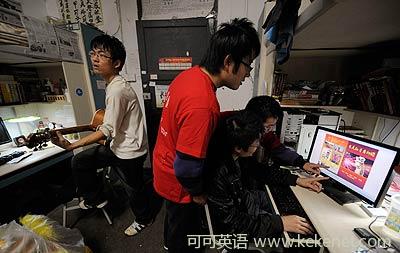(单词翻译:单击)

Zhao Qianyi, 18, a freshman at Jilin University, feels lost without his computer, on which he connects with family and friends, watches videos and even does homework.
作为一名来自吉林大学的大一新生,18岁的赵谦一(音译)因为不能用电脑而感到有些失落,因为他平时都是在网上和家人朋友联系、看视频、甚至是做作业的。
To make matters worse, Zhao will be without his computer for the entire year. "It is very inconvenient," he said. "Many freshmen are complaining."
更糟的是,赵谦一将告别电脑一整年的时间。他说:"这太不方便了,新生们怨声载道。"
This year, Jilin University announced a ban on freshmen bringing computers to their dorms.
今年,吉林大学宣布禁令,严禁大一新生在宿舍中使用电脑。
The decision has drawn complaints from both students and experts, as more and more schools decide to impose such bans to encourage freshmen to focus more on their studies rather than screens.
为了鼓励新生们集中精力放在学业上,也不是整日对着电脑屏幕,各大高校纷纷实施"电脑禁令",这项举措也招致学生与专家学者们的抱怨。
At China University of Petroleum in Beijing it is already a tradition to ban freshmen from bringing computers to their dorm.
在中国石油大学,禁止大一新生在宿舍中使用电脑已是一项老传统了。
"We found over the years that following an intense high school environment, some freshmen tend to indulge in their freedom on Internet," said Chen Dongsheng. "Many experienced a slump in their grades at college."
陈冬生(音译)表示:"多年来我们发现,在紧张的高中学习生活之后,一些大一新生开始放纵自己、沉迷网络。在大学期间,许多人的学习成绩大幅下滑。"
Preventing such indulgences is cited by many schools as a reason for banning computers in freshmen dorms.
许多大学之所以禁止大一新生在宿舍中使用电脑,就是为了防止网瘾。
Wang Guanjun, a Qingdao-based psychologist, agrees with this measure. He said that self-control among high school graduates is not strong enough to grant them total freedom.
来自青岛的心理学家王冠军十分赞成该项举措。他表示这些刚刚告别高中生活的大一新生们尚不具备足够的自制力,因此不能给予他们完全的自由。
"Many freshmen are overwhelmed by being in charge of everything in their lives and they are prone to indulge," said Wang.
王冠军说:"很多大一新生自我管理生活中的方方面面时常常不知所措。他们容易纵容自己。"
Some freshmen also understand the ban.
一些大一新生对于这项禁令表示理解。
Chen Jiamin, 18, is a freshman at Nanjing University. She said that if she needs a computer for studying purposes she always goes to the library, whereas a computer in the dormitory functions more like an entertainment unit.
南京大学大一新生,18岁的陈佳敏(音译)表示,如果她需要用电脑学习的话,她就会去图书馆。而在宿舍里,电脑更像是娱乐工具。
"The library computers are good enough for word processing and research," said Chen. "And without computers in the dormitory, we can spend more time talking to roommates rather than chatting online."
陈佳敏说:"图书馆的电脑用来处理文字以及做调查研究工作已经足够了。如果宿舍里没有电脑的话,我们就能花更多的时间来跟室友交谈而不是上网聊天。"
However, Zhang Xin, from the Education School at Qingdao University, said that students have to learn self-control by themselves. An order imposed by the school might have the opposite effect.
而来自青岛大学教育学院的张欣(音译)则表示,学生们必须靠自己学会自控。学校的强制禁令或许会适得其反。
"In practice, the ban just delays the problem until the sophomore year," said Zhang.
张欣说:"事实上,这项禁令仅仅是把这个问题推迟到大二学年。"
He suggested that limiting Internet hours in the dorm would suffice to prevent indulgent behavior.
他建议只要限制学生在宿舍中的上网时间,便足以杜绝网瘾了。
Xie Qianjun, from the student affairs office at Huazhong University of Science and Technology, thinks banning computers is an outdated method.
来自华中科技大学学生事务处的谢前军(音译)认为"电脑禁令"已经过时了。
"The majority of freshmen used computers regularly while at high school," said Xie. "To suddenly take them away from freshmen is to compel them to swarm into Internet cafés, which is even harder for schools to manage."
他说:"大部分新生在高中时便经常用电脑了。突然封杀电脑,会迫使新生们蜂拥到网吧中,这会更加大学校的管理难度。"
Jilin University freshman Zhao Qianyi echoed Xie's notion.
对于谢前军的看法,吉林大学新生赵谦一表示赞同。
Many of his peers sneak to Internet cafés to update social networking sites or play games.
他的很多同学都偷偷跑去网吧更新自己的社交网站或是玩游戏。
"I don't think banning computers will keep them from indulging," said Zhao.
赵谦一说:"我认为禁用电脑并不能防止他们染上网瘾。"


